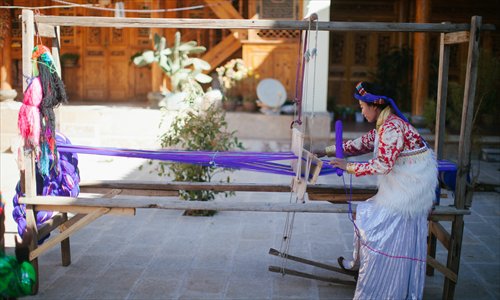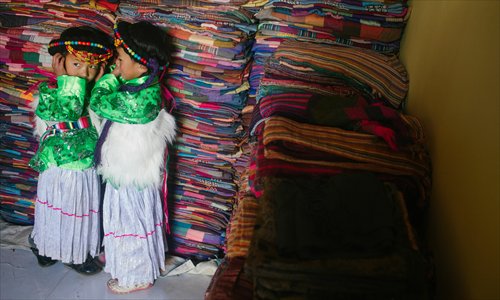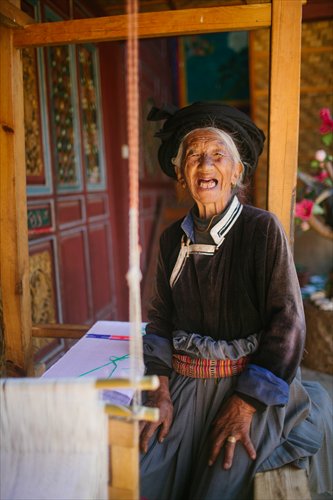China’s only matriarchal society threatened as young females head to cities for work

Shougong Geiru Yongqing weaves on a loom at her house. Photo: Li Hao/GT
Shougong Geiru Yongqing remembers leaning against her grandmother's loom when she was in elementary school and watching the wooden shuttle fly across the fabric. Sometimes her grandmother would start singing in Mosuo.
She started learning how to weave a couple of years later, like most girls in the village. And when she was 13, she wove her first piece of fabric by hand.
The 24-year-old lives in Walabi, a traditional Mosuo village of 70 households in Lijiang, Yunnan Province. The Mosuo people are an ethnic group that live in Southwest China and maintain the only matriarchal society in the country. The Mosuo are a small group, with a population of around 53,000 in a country of 1.3 billion, or 0.004 percent of the total population, according to a report by the United Nations Development Program (UNDP).
When she was young, every household had a loom and women often sat and weaved in their spare time. As tourism developed in the area, their fabrics became popular in nearby cities, turning their traditional arts into a big moneymaker. But nowadays, more and more young people are choosing to work in the cities and their traditional way of life is breaking down.

Three-year-old twin Mosuo girls play in a storage room in the Shougong household. Photo: Li Hao/GT
Staying back home
Shougong only came back to the village in recent years. She started working in the city of Lijiang when she was 13. Her sister had a shop back then that sold scarves and various traditional Mosuo products and her brother had a bar in the city. Since then, she's worked in many jobs. She has waited tables at restaurants and worked in clothes shops.
But her maternal grandfather fell ill a couple of years ago, and at the time her older sister had just had twin girls and couldn't spare any time to take care of the family. Her parents told her to come back to the village and uphold Mosuo traditions.
According to tradition, there needs to be at least one woman living in every household, and women are encouraged to stay home to form the core of the family unit. Shougong has four brothers that are all working away from home, while she and her sister take care of their grandparents and run the household to take over these responsibilities from their aging mother.
The reason for this is that the Mosuo people have a tradition of zouhun (walking marriage), where partners live in different households during the day. The men come over to their wives' houses at night only, and children from these relationships are raised solely by their mothers and mothers' families, and take their mother's family name. Therefore without sufficient women, the Mosuo traditional family structure is not sustainable.
"My parents said there has to be at least one woman at home," Shougong said. "There's no arguing over that point. It's tradition."
Shougong and her older sister are two of the few local young women who stayed back in the village at their parents' insistence. Many young people in recent years have chosen to find jobs outside for a variety of reasons, including wanting to see the world, making more money, or simply being tired of the hardships that come with living in a remote rural village. This act draws disapproval from many village elders.
"They think it's easier to live in the big cities, some wait tables and get 3,000 yuan ($468) a month, it's not that hard," Shougong's father, Wengchong Gaoru said.

An elderly Mosuo woman sits next to her loom. Photo: Li Hao/GT
Yearning for the outside
Xiong Lamu and her sister are among those who left the village a few years ago to work. In January 2016, her sister will be marrying an ethnic Han (China's majority ethnicity) living in Lijiang, and that will end any possibility of her returning home and living in a traditional way.
Many people have left because it was too hard to make money in Mosuo villages, which are often isolated and located deep inside the mountains. Transportation links there are poor and opportunities rare.
Last month, an airport was finished next to Lugu Lake, making it easier for people in the area to fly to Kunming, capital of Yunnan. A flight leaves the airport every other day. But before that, if people had to get in and out of the village, they needed to take a bus for around 10 hours through the mountains, on muddy roads. However flights are too expensive for most villagers.
When the Global Times reporter visited Xiong's mother Ani Buchi, who still lives in the village as head of her household, she had just come back from gathering firewood in the mountains. Every couple of days she and her husband, like many villagers, walk for two hours up into the mountains and chop down dead trees. They usually bring food and supplies with them and stay in the mountains for a couple of days.
Then, they carry firewood down the mountain on their backs and use a horse cart to drag it all home.
She gets up early in the morning and does many household chores, cooking, cleaning, feeding pigs, chopping firewood, and weaves when she has time, like many other older women still in the village. But this clearly is not a lifestyle that appeals to the young.
When Ani talked about her daughters, she said she's already accepted the fact that they may not be coming back, but she looked a little disappointed. She secretly wants to talk to Xiong and convince her to stay home, now that her sister is married, but is unsure whether she'll listen.
"My aunt and my mother are unhappy about this, they want my daughters to come back, but what can I do?" she said. "My oldest daughter studied at an outside school and ended up working in a big city, she can't get used to a life here."
Trying to uphold culture
A society cannot survive without young people. Local authorities have tried to create economic opportunities to entice young people to stay with their families.
Aqi Duzhima, then village Party secretary, established a Mosuo handicraft association in 2003 that gathers women together to weave fabric for sale. The crafts became highly popular. In its first year, more than 900 people joined the association.
Later, they had official aid as well. Starting in 2006, the UNDP launched a program to help the Mosuo people improve their traditional craft industry and help solve their difficulties.
According to the UNDP official website, the aim of the program is to "help the struggling community stem the tide of cultural erosion" and it began by strengthening Mosuo traditional handicrafts, bringing in experts to help teach what sort of patterns consumers might like, as well as more complicated dyeing and weaving techniques.
The Jialan Group is one of the companies that came to the area after the UNDP started its program. It sent a crew to film a promotional video of the weaving process.
Chen Juanling, head media director of the company, wrote in her blog that the program "kept the women busy, brought income to their families and helped sending their children to school."
For a while, these efforts seemed to be paying off. Media reported that the tide of young women leaving was stemmed. One Mosuo woman said that now she could earn money and be with her family at the same time, which was the biggest attraction for them.
But this prosperity was short-lived. In recent years, tourism in China has developed rapidly, especially in Yunnan, where the province's natural beauty and authentic ethnic handicrafts have led to crowds flocking there.
Soon, machine-woven ethnic-style fabrics filled the market. Compared to handwoven ones, they are neater, tighter, and much cheaper.
"The machine-woven ones are usually sold for 10 yuan a piece, while a hand-woven one is at least 30 yuan," Shougong's father Wengchong said. "Also a machine can weave 100 scarves per day, while a person can only do 10 per day."
The temporary boom and enthusiasm created by the program soon died down and the village became quiet once more as women started to once again look for greener pastures away from their families.
A dead end
On weekends, Aqi teaches young people from the village how to weave, still following Mosuo traditions.
Fifteen-year-old Cili Zhima has been learning for about a year and can weave by herself. She skillfully passes the shuttle back and forth, stopping now and then to adjust the fabric.
Cili is currently a sophomore student in high school. Many of her friends have found jobs in the city since graduation and she's not sure whether she'll follow suit in a year.
"I like weaving," she said. "But my friends say this can't make money."
Right now, Aqi still weaves, but more for teaching and conservation purposes. The second floor of her wooden house now functions as a storeroom, filled with more than a year's worth of unsold scarves, tablecloths and decorative fabrics made by villagers and herself.
She still runs the workshop, but women only come by now and then between their field and house chores.
"Even I don't do it that often anymore, I don't have time," she said. "I've got these pigs and mouths to feed."
In warmer weather, some still go into the city to sell scarves, but how much one can sell per day entirely depends on luck, sometimes up to 10, sometimes nothing. It can't compare with the old times, when thousands of orders came streaming in.
The only people left in the village are older people and school children. Without young women to take over as the heads of households, Mosuo traditions seem to be at risk of extinction. But Aqi says she doesn't feel worried about the village being empty.
"This is always a phase with the youngsters," Aqi said, pointing to Shougong. "She worked out there too, but now she's back taking care of her family. Give it time, they will all come back."
Newspaper headline: Walking women